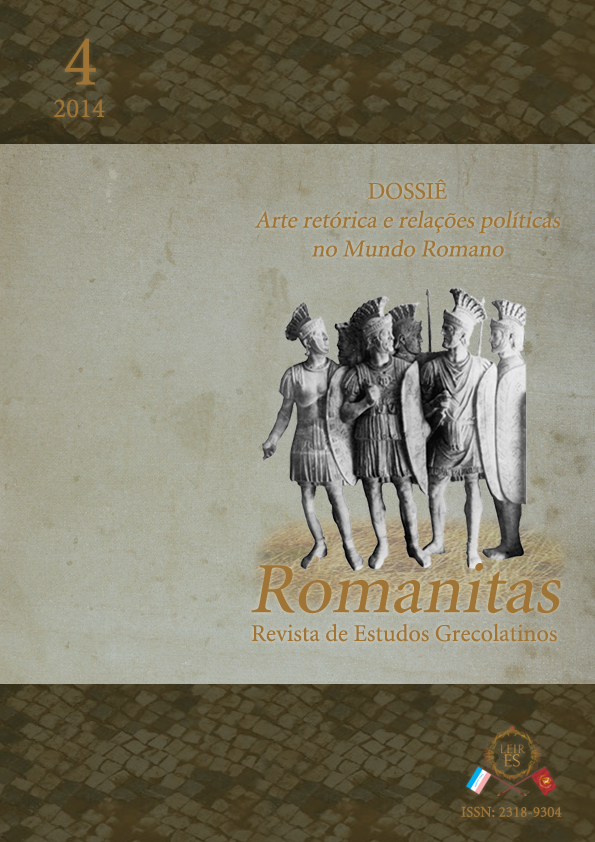The 'Moretum', the slavery and the Principate
DOI:
https://doi.org/10.17648/rom.v0i4.9203Keywords:
Moretum, Slavery, PrincipateAbstract
This article focuses on the Moretum, a poem contained in the Appendix Vergiliana. The studies devoted to this poem usually analyze its literary structure, trying to qualify its style and relations with the epic genre. My purpose is to analyze it as part of discussions about slavery in the Early Roman Empire, which took place in the context of tensions between emperor and aristocrats during the Principate.
Downloads
References
Documentação primária impressa
APPENDIX VERGILIANA. Ed. M. G. Iodice. Milano: Mondadori, 2002.
PETRÔNIO. Satyricon. Edição bilíngue. Trad. Sandra Maria G. B. Bianchet. Belo Horizonte: Crisálida, 2004.
PLINY THE ELDER. Natural History. Massachusetts: Harvard University Press, 1952; 1963. v. VII, VIII.
SÊNECA. Cartas a Lucílio. Trad. J. Segurado e Campos. Lisboa: Fundação Calouste Gulbenkian, 1991.
TACITE. Annales. Paris: Les Belles Lettres, 1953. 3 v.
Obras de apoio
BLAIR, W. An inquiry into the state of slavery amongst the Romans from the Earliest Period till the establishment of the Lombards in Italy. Edinburgh: Thomas Clark, 1833.
BRADLEY, K. R. Slavery and society at Rome. Cambridge: Cambridge University Press, 1996.
BRAMBLE, J. C. Minor figures. In: EASTERLING, P. E.; KENNEY, E. J. (Ed.). The Cambridge History of Classical Literature. Cambridge: Cambridge University Press, 1996, p. 467-494.
BRYSON, N. Looking at the overlooked: four essays on still life painting. London: Reaktion Books, 1990.
CONNORS, C. Monkey business: imitation, authenticity, and identity from Pithekoussai to Plautus. Classical Antiquity, v. 23, n. 2, p. 179-207, 2004.
D’ARMS, J. H. Slaves at Roman convivia. In: SLATER, W. J. (Ed.). Dining in a Classical Context. Ann Arbor: The University of Michigan Press, 1991, p. 171-183.
DOUGLAS, F. L. A study of the 'Moretum'. New York: Syracuse University, 1929.
ELIAS, N. La sociedad cortesana. México: Fondo de Cultura Económica, 1996.
ÉVRARD, É. Quelques traits quantitatifs du vocabulaire du Moretum. Latomus, t. 41, fasc. 3, p. 550-565, 1982.
FAVERSANI, F. A pobreza no Satyricon de Petrônio. Ouro Preto: Editora da UFOP, 1999.
FAVERSANI, F. Estado e sociedade no Alto Império romano: Um estudo das obras de Sêneca. Ouro Preto: Editora UFOP/PPGHIS, 2012.
FITZGERALD, W. Labor and laborer in Latin Poetry: the case of the Moretum. Arethusa, v. 29.3, p. 389-418, 1996.
FITZGERALD, W. Slavery and the Roman literary imagination. Cambridge: Cambridge University Press, 2000.
GARNSEY, P. Famine and food supply in the Graeco-Roman World: responses to risk and crisis. New York: Cambridge University Press, 1988.
HABINEK, T. N. The politics of Latin Literature: writing, identity, and Empire in Ancient Rome. Princeton: Princeton University Press, 1998.
HAIRSTON, E. A. The Ebony Column: Classics, civilization, and the African American reclamation of the West. Knoxville: University of Tennessee Press, 2013.
HALEY, S. P. Be not afraid of the dark: critical race theory and Classical Studies. In: NASRALLAH, L. & FIORENZA, E. S. (Ed.) Prejudice and Christian beginnings: investigating race, gender, and ethnicity in Early Christianity. Minneapolis: Fortress, 2009, p. 27–49.
JOLY, F. D. Libertate opus est: escravidão, manumissão e cidadania à época de Nero (54-68 d.C.). Curitiba: Progressiva, 2010.
JOLY, F. D. Tácito e a metáfora da escravidão: um estudo de cultura política romana. São Paulo: Edusp, 2004.
JONES, C. P. Dinner theater. In: SLATER, W. J. (Ed.). Dining in a Classical Context. Ann Arbor: The University of Michigan Press, 1991, p. 185-198.
KENNEY, E. J. Moretum, a poem ascribed to Virgil: the ploughman’s lunch. Bristol: Bristol Classical Press, 1984.
KOLENDO, J. O camponês. In: GIARDINA, A. (Org.), O homem romano. Lisboa: Presença, 1991, p. 169-178.
PITA, L. F. D. O cotidiano do trabalhador romano segundo o Moretum. Revista Tessituras, v. 1, p. 1-9, 2010.
RAND, E. K. Young Virgil’s Poetry. Harvard Studies in Classical Philology, v. 30, p. 103-185, 1919.
RODRÍGUEZ-PANTOJA, M. El Moretum, estudio lingüístico y literário. Habis, v. 8, 1977, p. 117-148.
ROLLER, M. Constructing autocracy: aristocrats and emperors in Julio-Claudian Rome. Princeton: Princeton University Press, 2001.
ROSS, Jr., D. O. The Culex and Moretum as Post-Augustan literary parodies. Harvard Studies in Classical Philology, v. 79, p. 235-263, 1975.
SCHUMACHER, L. Sklaverei in der Antike: Alltag und Schicksal der Unfreien. München: Beck, 2001.
SNOWDEN, F. M. Before color prejudice: the ancient view of Blacks. Cambridge: Harvard University Press, 1983.
SNOWDEN, F. M. Blacks in Antiquity: Ethiopians in the Greco-Roman experience. Cambridge: Harvard University Press, 1970.
STEELE, R. B. The authorship of the Moretum. Transactions and Proceedings of the American Philological Association, v. 61, p. 195-216, 1930.
TODD, O. J. The Authorship of the Moretum. Classical Philology, v. 20, n. 4, p. 336-340, 1925.
ZIOLKOWSKI, J. M.; PUTNAM, M. C. J. (Ed.). The Virgilian tradition: the first fifteen hundred years. Yale: Yale University Press, 2008.
Downloads
Published
Issue
Section
License
Copyright (c) 2015 Romanitas - Revista de Estudos Grecolatinos

This work is licensed under a Creative Commons Attribution-NonCommercial-NoDerivatives 4.0 International License.
a. The authors retain copyright and grant the journal the right to first publication.
b. The authors are authorized to assume additional contracts separately, for non-exclusive distribution of the version of the work published in this journal (e.g., publishing in institutional repository or as a book chapter), with acknowledgment of authorship and initial publication in this journal.
c. Authors are allowed and encouraged to publish and distribute their work online (e.g. in institutional repositories or on their personal page) after the first publication by the journal, with due credit.
d. The journal's texts are licensed under a CC BY 4.0 Deed Attribution 4.0 International Licence (CC BY).

























